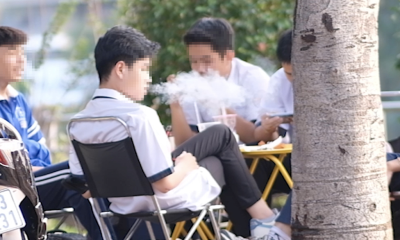News
Thailand Urged to End Forced Repatriations of Political Dissidents

Human Rights Watch has urged Thailand’s government on Thursday to cease forcing political dissidents who came to Thailand for protection to return to authoritarian home nations, where they risk torture, persecution, or death.
According to a new report by Human Rights Watch, Thai authorities regularly violated international law by dismissing dissidents, many of whom were registered as refugees with the UN and awaiting resettlement in third countries.
The research, “We Thought We Were Safe,” examined 25 incidents that occurred in Thailand between 2014 and 2023.
Many of the instances included the forcible repatriation of Cambodians, with Cambodian security personnel suspected of involvement. However, the group also noted examples where dissidents in Vietnam, Laos, and China were “tracked down and abducted,” or “forcibly disappeared or killed.”
According to the study, in exchange for tracking down and returning the dissidents, the Thai government requested help from Laos, Cambodia, and Vietnam to spy on Thai dissidents who fled their native country to avoid political repression.
Human Rights Watch Thailand described this as a quid pro quo kind of transnational repression in which “foreign dissidents are effectively traded for critics of the Thai government who live abroad.”
Thailand’s forced repatriation of asylum seekers
According to the group, such arrangements, known informally as “swap mart,” became more common after the Thai army attempted a coup in 2024, deposing an elected government.
Military and military-backed administration lasted ten years till an elected civilian government led by Prime Minister Srettha Thavisin won power last year.
“The Thai government should investigate the charges of harassment, surveillance, and forced repatriation of asylum seekers and refugees in Thailand. “It should look into the disappearance of Thai anti-junta activists in other Southeast Asian countries,” Elaine Pearson, director of Human Rights Watch’s Asia Division, told The Associated Press.
“I think there is an opportunity to end this practice and for the Srettha administration to show it is different from the previous military-led government,” she said.
She stated that the Thai government is presently seeking a membership on the United Nations Human Rights Council, which “comes with responsibilities to protect human rights.”
The report highlighted nine examples of Thai activists kidnapped or died in Laos and Cambodia under suspicious circumstances. According to the report, the majority of reported instances have yet to be addressed or prosecuted.
Bodies of two missing activists
The mutilated bodies of two missing activists were discovered in late 2018 floating on the Mekong River. Wanchalearm Satsaksit, a young Thai activist, was kidnapped on the street in Cambodia’s capital Phnom Penh in 2020 and has never been heard from since.
Thai authorities have constantly denied any connection to similar incidents.
Dr. Francesca Lessa, an associate professor of International Relations at University College London, said there were some parallels with how dictatorial regimes in Latin America agreed to work together to destroy political opponents on each other’s territory in the late 1970s and 1980s.
“Whether they follow right or left ideologies, these autocratic governments consider opposition and dissent as constituting a threat to their survival in power and, thus, to be eliminated, whatever the means required,” Lessa said.
When asked about the Human Rights Watch report, Thai Foreign Ministry spokesperson Nikorndej Balankura stated that Thailand is committed to respecting and upholding humanitarian principles, such as not forcing asylum-seekers and refugees to return to countries where they may face persecution or where their lives or freedoms are threatened.
A positive step for Thailand
Separately, the Thai Foreign Ministry stated Thursday that the country had completed the ratification process for the International Convention for the Protection of All Persons from Enforced Disappearance, which will take effect on June 13.
Thailand has had its own law on the prevention and suppression of torture and enforced disappearances since 2003, according to the statement. According to the government, Thailand has now ratified eight of the nine core international human rights accords.
Human Rights Watch described the ratification as a positive step, but stressed that Thailand must follow through on its statements. “The best way Thailand can show its commitment is by opening fresh investigations into cases of enforced disappearances,” she stated. “Their families deserve justice.”
Protection of All Persons from Enforced Disappearance
On January 9, 2012, H.E. Mr. Norachit Sinhaseni, Ambassador, Permanent Representative of Thailand to the United Nations, duly authorized and empowered by the Royal Thai Government, signed the International Convention on the Protection of All Persons from Enforced Disappearance in the Treaty Room of the Office of Legal Affairs at the United Nations Headquarters in New York.
The signing reflects Thailand’s political will to refrain from any act that would undermine the Convention’s object and purpose, as well as its determination to enact domestic laws that are consistent with the Convention’s obligations to protect all Thai citizens from enforced disappearances.
The signing of the Convention can be viewed as part of Thailand’s implementation of the obligations and voluntary pledges made in its application for participation in the Human Rights Council (HRC) for the term 2010-2013.
Furthermore, as part of its evaluation under the Human Rights Council’s Universal Periodic evaluation (UPR) process in October 2011, Thailand announced a number of voluntary undertakings, including signing the Convention on the Protection of All Persons from Enforced Disappearance.
After Thailand has ratified the Convention, it will enter into force. Currently, the Ministry of Justice, the lead agency, is in the process of drafting/amending laws to align with the Convention and then presenting a draft Act to the Cabinet for consideration.













